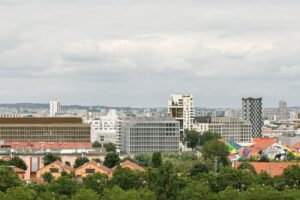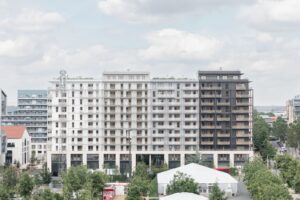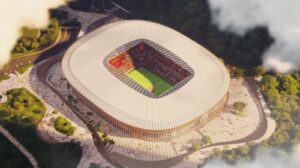Zero Waste Architecture and Vertical Cities are the Solution: Architect Hafeez Contractor

“Looking at the present lockdown situation, we will have to find some permanent solutions. Life will start moving, we have to look at our population, which is the youngest and our greatest asset. The main challenge for architects and designers is how we are taking care of our population’s employment, food and housing. We are focusing on zero wastage designing, compressing the architecture without compressing the size of the room. Eliminating unnecessary spaces for more compact and efficient houses is the new norm today. The price is very important but at the same time, we want facilities,” Architect Hafeez Contractor emphasised while addressing the first-panel session on the theme ‘The Future of Design’ on day 2 of the virtual panel discussion on the ‘Future of Design & Construction’ organised by CorpGini, in conversation with Utsav Mathur, Founder, CEO of GMetri and Sharam Randheria, Partner, (EQUALS TO design lab).
Addressing the next session co-moderated by Tanuj Thomas (EQUALS TO design lab), Hafeez declared, “I feel that there’s going to be a complete change in the way we’re going to build. The world’s population is 7.5 billion, soon it’s going to be 10 billion. Small buildings will not be an answer. We will have to move at lightning speed. There will be completely new materials, like carbon concrete, which will enable 200-storey buildings! It will have to be completely self-contained, a city within a building. We have to leave the land in its natural from for rivers and growing food, live in a different way.”
Commenting on the aspect of public spaces for India, Hafeez underlined the challenges of housing today’s 1.3 billion population of which 60% are aged less than 30 going forward, 8 years down the line when they are married and the population increases further. “We have to look at urban spaces for all of that. And for that, how our urban fabric, how we will design new cities is going to be more important. Land is a precious commodity that cannot be manufactured. We have to change our laws, how we’re going to design our cities and that is going to trickle down to urban spaces,” he emphasised.
Hafeez also called for a revamp of architecture education. “We see what is happening in colleges right now, in some of them the final year students can’t even draw. When we have students coming to us for an internship, we know what they know. Something needs to be done about architecture education.”
Utsav Mathur, Founder, CEO of GMetri, who co-moderated both the sessions, opined that technology would play an important role in the process going forward. “Newer technologies may see a surge. Ideas are going to gain more importance. The problem of migrant labour persists but there will be a rise of customisation. Massive reskilling of labour is required with Virtual and Augmented Reality coming into the picture. Designers would need to research and collaborate and come together as a community post-COVID-19. All of sudden people are going digital. Remote working is the new norm. Lots of sectors are going remote. Priorities have shifted, we need to stay home, stay safe.”
Commenting on the impact that COVID-19 would have on design when it comes to certain aspects, Utsav drew attention to how due to social distancing, people are discouraged from using public spaces. “Morning walks are restricted as is the use of transport and much more. There are some things that are going to stay the same even after the lockdown is lifted, like the use of public spaces so it will require solutions.”
Architect Reza Kabul explained that “No doubt that we have to go vertical but vertical with digital is important. People would prefer a digital meeting rather than travelling. The amount of energy and carbon footprint that can be saved will be massive. We should do mixed-use cities, where we do not have much need for transport. Do more vertical cities, satellite cities. In modern times our public spaces represented shared values. The outbreak of coronavirus has raised many questions on the role of public spaces. Home is the only safest place suddenly.
Vijayshree Pednekar, Urban Transport Planner, The Urban Project, opined, “I think People are going to claim back their spaces and cherish it. We need to work at the neighbourhood level. At times of emergency, people at the local level can work efficiently. If we’re looking at urban areas, we have to look at all the urban areas; we have to take a collaborative decision. Today it is COVID-19, tomorrow it will be something else.”
Vishal Shah, Founder, Aangan Architects, explained, “There are two things we are looking at – how collectivism and individualism are looked at in urban spaces. Open spaces are very important for the health of the community. We have to look at it from a very different perspective. Our public spaces are not only parks and gardens, they are streets and railway stations as well. Public spaces are going to see a big turnaround. We will have to look at the densities of cities in a good manner. We can’t keep endlessly spreading. We have large cities like Mumbai, Bangalore but there are also Tier 3 cities. Stronger neighbourhoods and more self-sufficient neighbourhoods should be encouraged.”
During the first session where the role of technology was analysed, Dushyant Asher, Principal Architect and Co-founder, The Urban Project, pointed out that “Currently, still we’re doing a lot by hand, on the other hand, we’re seeing a lot of technologies are emerging. There needs to be a fundamental shift in the materials we choose and subsequently, the technologies we use.”
Krishnan V., Partner at Krishnan Parvez Architects, concurred. “There’s going to be a huge difference in how we look at projects now post COVID-19. The skill of the labour is not going to be put away from the field. Skills need to be upgraded with time. Technology can come in and make it more fool-proof, errors can be easily detected by technology. How hygiene is looked at as a part of the design is really important and a major problem that needs to be addressed,” he said.
Senthil Kumar Doss, Principal Architect and Founder at Play Architecture, recommended, “”Look at technology in two different ways – technology which will take you global, and technology that will take you, local. We need to keep connected to the past and look forward to the future.”
Srivathsan, Executive Director, Centre for Research on Architecture and Urbanism, underlined that blended learning is going to be the norm. “Institutions are communities of learning, particularly for design learning you need to come together. The institutional nature itself, is an institution agile, can it readjust, will be important,” he underlined.
Shahram Randeria, (Equals to Design), concluded that every region has its own individuality identity and its own culture that they need to look back to. “The design community requires to bring back the people together,” he affirmed.
Neha Jain, co-founder, CorpGini, shared how these sessions with industry stalwarts have been getting huge feedback and participation. “This is a unique format, tomorrow’s sessions will focus on solutions to the industry crisis caused by COVID-19,” she shared.
The ‘Future of Design & Construction’ panel being held across 3 days (April 20-22, 2020) will witness an amalgamation of expertise from varied professionals within the design and construction community and the financiers backing the construction industry. It’s a given that Covid-19 will bring about a change that no one can anticipate and sessions like these will help the community poise itself for this change.
This event is organized by CorpGini in collaboration with GMetri, FLOW Studio, EQUALS TO design lab, and KPa. CorpGini will continue to organize more such vertical-specific events with a view to solve bigger corporate concerns with startups innovative solutions.
CorpGini, founded in 2019, is an initiative by Pantomath Group and Z Nation Lab that connects leading corporates to innovative startups that are building solutions that solve industry-wise problems.
Corpgini has been organizing sector specific events . Last week they organized one of the largest innovation gathering with 50+ Leaders, 5000+ Corporates and 100+ Startups in fight against Covid-19 to solve corporate sustainability and growth challenges . The (Corporate) Punch will, hence, help aid all participants to not just feel a sense of community in this time of crisis, but also aid as a platform for prospective business development and lead generation. Via the virtual sessions, will be a welcome relief in the times of quarantine and self-isolation; helping participants to feel like they belong to a larger global community that is trying to fight this battle together.
(Source: Originally published on www.hospitalitybizindia.com, reproduced here for wide circulation in Architecture fraternity only.)








